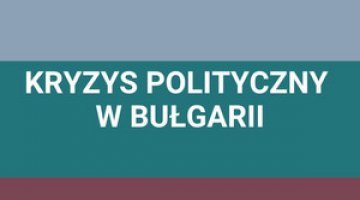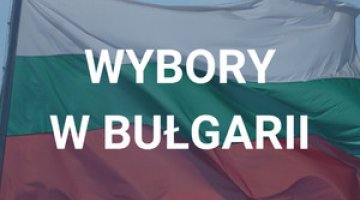Temporary stabilisation? Bulgaria’s new government
On 6 June 2023, Bulgaria’s parliament passed a vote of confidence in the coalition government co-formed by two biggest parliamentary groups: GERB-Society of Democratic Forces (GERB-SDS) and Continuing Change-Democratic Bulgaria (PP-DB). Nikolai Denkov, a politician linked to PP, will be appointed prime minister. 130 MPs from both parliamentary groups and two of the 35 MPs from the Movement for Rights and Freedoms party (DPS), which represents the Turkish minority, supported the vote of confidence. This gives the new government a stable majority in the 240-member National Assembly.
The GERB-SDS/PP-DB coalition agreement envisages a rotating model of government in the coming 18 months. Nikolai Denkov is a 61-year-old chemistry professor and former minister of education and science in several previous governments. He will serve as Bulgaria’s prime minister for the first nine months. Mariya Gabriel from GERB–SDS is a 44-year-old former member of European Parliament and European Commissioner for Innovation, Research, Culture, Education and Youth between December 2019 and May 2023. She will be appointed deputy prime minister and minister of foreign affairs and for the subsequent nine months, she will take her turn as Bulgaria’s prime minister. Asen Vasilev will be appointed minister of finance and will supervise the spending of EU funds and Atanas Slavov is the new minister of justice. Both Vasilev and Slavov are members of the PP-DB parliamentary grouping. Besides these, other members of the new government are not aligned with any political party and are considered experts.
The agreement made in mid-April 2023 regarding the rotating model of appointing the speaker of parliament (for a three-month term) marked the launch of efforts to build a coalition between GERB-SDS and PP-DB. Negotiations to form a government were broken off several times and the first mission to form a government with Mariya Gabriel as prime minister failed. Tensions between the two groupings continued until the last moment. At the end of May, a PP-DB deputy published a recording from a meeting of party leaders during which they made disrespectful comments about their political opponents and discussed plans for reaching an agreement with EU institutions regarding political change in Bulgaria, once they take power.
Commentary
- Despite its limited planned duration, the coalition agreement between GERB-SDS and PP-DB creates the prospect of an at least temporary stabilisation of the executive branch of government and enables Bulgaria to maintain its pro-Western course. It was signed due to a prolonged political crisis, during which parliamentary groups were unable to form a majority government, combined with the prospect of Bulgaria holding its sixth early parliamentary elections since spring 2021. The government has been formed as a result of a difficult compromise between the leaders of the two major political camps and former prime ministers: Boyko Borisov (GERB) and Kiril Petkov (PP). PP was established in 2021 as an alternative to GERB’s rule during which numerous corrupt practices were revealed. From the point of view of this party, co-forming a government with GERB carries with it the serious risk of losing its voters’ confidence. As regards GERB, in two recent election campaigns it applied the strategy of polarisation and expressed radical criticism of the PP and of Petkov’s rule (December 2021 – July 2022). The coalition received support from the leadership of the European People’s Party (GERB is one of its members) and other institutions. This is important in the context of growing support for the openly pro-Russian extreme right Revival party and for President Rumen Radev whose electorate has similar views.
- Due to strong antagonism and mutual distrust between the two victorious political groups, a rotating model of government was adopted with Denkov and Gabriel taking turns as prime minister. It resembles the model involving a government of experts rather than the ‘grand coalitions’ of two major parties, such as those formed in Austria and Germany in previous years. Its durability is also uncertain – in the most optimistic scenario it will last less than half of the four-year parliamentary term. GERB and PP have agreed that after nine months prime minister Denkov will step down and Mariya Gabriel will form a new government. However, this may trigger new tensions during the negotiations over the new cabinet’s line-up. Some members of both groups were clearly opposed to the plan to form a provisional coalition between GERB and PP, which may undermine the stability of support for the new coalition government.
- The GERB-SDS/PP-DB government has strong reformatory ambitions, which both groups have cited as the main justification for forming the coalition. It plans to focus on achieving the most important goals in Bulgaria’s foreign policy: to join the Schengen Area by the end of 2023 and to adopt the euro at the beginning of 2025. It also plans to pass the country’s 2023 budget within three weeks (so far the provisional government has operated on the basis of a provisional budget), and to set the budget deficit at 3%. The ruling parties will also attempt to boost the fight against corruption and to amend the constitution so as to weaken the president’s influence on the intelligence services and the judiciary. Moreover, they intend to modify the electoral system to prevent the fragmentation of future parliaments and thereby avoid another political crisis. However, these reforms can only be implemented if they receive backing from the opposition DPS party. The new government is in favour of supporting Ukraine, although due to Bulgaria’s relatively limited military and financial potential it is unlikely that this support will be significantly increased.
- The Denkov-Gabriel government was established in opposition to President Radev, who has been the main beneficiary of the political crisis and continued to form consecutive provisional governments which were loyal to him. The new government was formed despite the scandals over the leaked recordings from the meeting of PP-DB leaders and the actions of the general prosecutor’s office which reopened the investigations launched several years ago against Borisov (who is suspected of hiding assets in Spain) and Petkov (who concealed the fact that he has dual Bulgarian and Canadian citizenship). These developments have likely been inspired by Radev, who supervises Bulgaria’s intelligence services (the former PP-DB MP who published the recordings is known for his favourable relations with the leadership of these services and with President Radev) and has major influence on the general prosecutor’s office. In this context, difficult relations with President Radev, whose second term will expire in 2026, will likely continue to be the main obstacle faced by the Denkov-Gabriel government.



